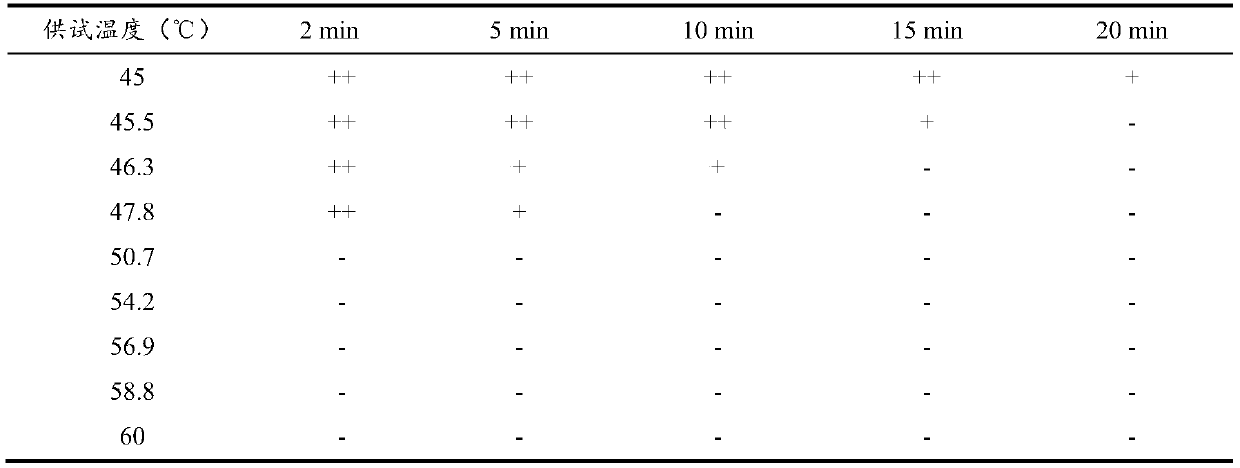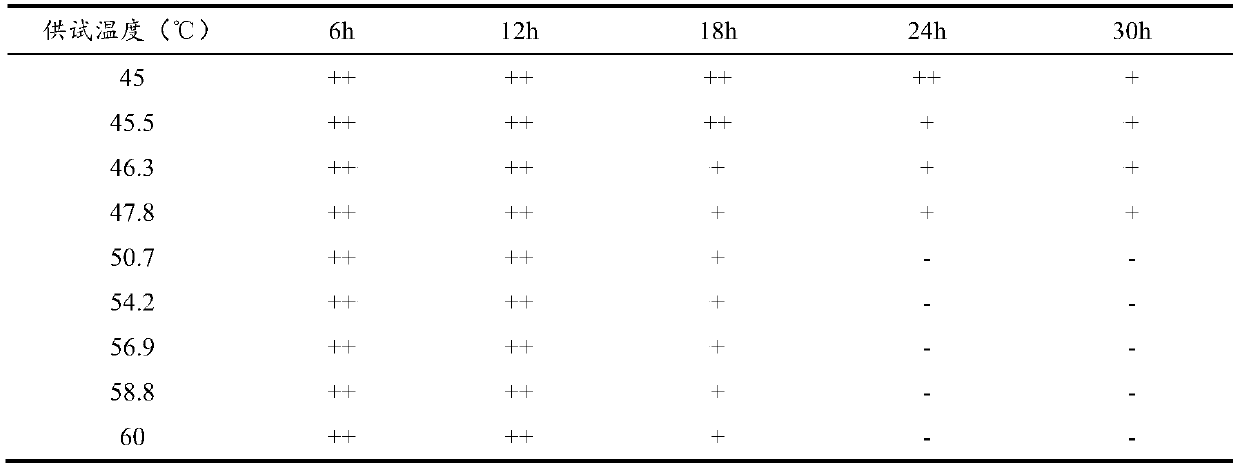Disinfection method of raw material seeds in bean sprout production and application of disinfection method
A disinfection method and technology of bean sprouts, applied in the fields of application, seed immunization, botany equipment and methods, etc., can solve the problems of pesticide residue consumer panic, big food safety, hidden dangers, etc., to reduce the occurrence of bean sprout diseases and have no pesticide residues , high safety effect
- Summary
- Abstract
- Description
- Claims
- Application Information
AI Technical Summary
Problems solved by technology
Method used
Image
Examples
Embodiment 1
[0032] Embodiment 1: The influence of different temperature treatment on bean sprouts anthracnose spore germination
[0033] The effect of different temperature treatments on the spore germination of bean sprout anthracnose was determined by spore liquid coating method. Put the purified mycelial mass of bean sprout anthracnose into sterile potato liquid medium (PD), place it in a shaker at a constant temperature of 150rpm at 25°C for 3 days, and then dilute it with sterile water to a concentration of 10% of the pathogenic spore suspension. 7 A / L spare. Use a pipette gun to draw 200 μL of spore suspension into a PCR tube, and then put it into a gradient PCR instrument for temperature treatment. The treatment temperature is 45-60°C, and the treatment time is 2min, 5min, 10min, 15min, and 20min. Treat 3 repetitions. Draw 100 μL of temperature-treated spore suspension onto the poured potato agar medium plate under aseptic operation, spread it evenly with a spreader, place it in ...
Embodiment 2
[0039] Embodiment 2: the impact of different temperature treatments on bean sprouts bacterial rot
[0040] With the test method of Example 1, the isolated bean sprout rot disease pathogenic bacteria were single-colonized into the LB culture medium, and the test was carried out after culturing at 28° C. for 24 hours with constant temperature shaking (150 rpm). The treatment temperature was 45-60°C, the treatment time was 6h, 12h, 18h, 24h and 30h, and each treatment was repeated 3 times.
[0041] The test results are shown in Table 2. The temperature treatment was 30-60°C, with a total of 16 temperature gradients. The plate was placed in a constant temperature incubator at 28°C for 24 hours and then the growth of colonies on the surface was recorded. The temperature test was repeated three times.
[0042] Table 2 Effects of different temperature treatments on bacterial bean sprout rot (24h)
[0043]
[0044] Note: "++" indicates a higher concentration of bacterial colonies, "...
Embodiment 3
[0046] Embodiment 3: the influence of different disinfection methods on mung bean germination
[0047] Mung beans were sterilized by dry heat at different temperatures, and the effects of different treatments on the detection rate and germination rate of mung bean pathogens were determined. Select plump and mature mung bean seeds (germination rate ≥ 98%) for experimental treatment, soak mung beans in clean water for 30 minutes to remove impurities, then screen the expanded mung bean seeds, select plump mung bean seeds and use a dry heat disinfection box for disinfection For treatment, the treatment temperature is 50-65°C, a gradient of 5°C, and the treatment time is 18h and 24h. Put the dry heat sterilized mung bean seeds in a dry heat disinfection box at room temperature for 24 hours to allow them to regain moisture naturally, so as to prevent the mung beans from being broken during subsequent processing; soak the mung beans that have naturally regained moisture in ozone nano...
PUM
 Login to View More
Login to View More Abstract
Description
Claims
Application Information
 Login to View More
Login to View More - R&D Engineer
- R&D Manager
- IP Professional
- Industry Leading Data Capabilities
- Powerful AI technology
- Patent DNA Extraction
Browse by: Latest US Patents, China's latest patents, Technical Efficacy Thesaurus, Application Domain, Technology Topic, Popular Technical Reports.
© 2024 PatSnap. All rights reserved.Legal|Privacy policy|Modern Slavery Act Transparency Statement|Sitemap|About US| Contact US: help@patsnap.com










